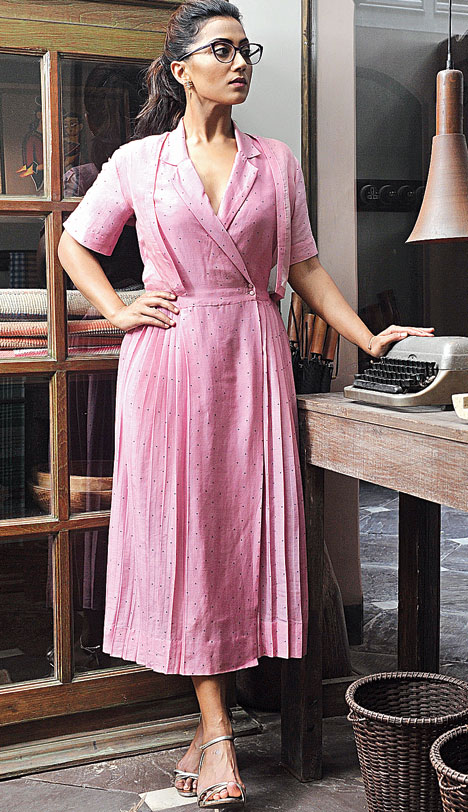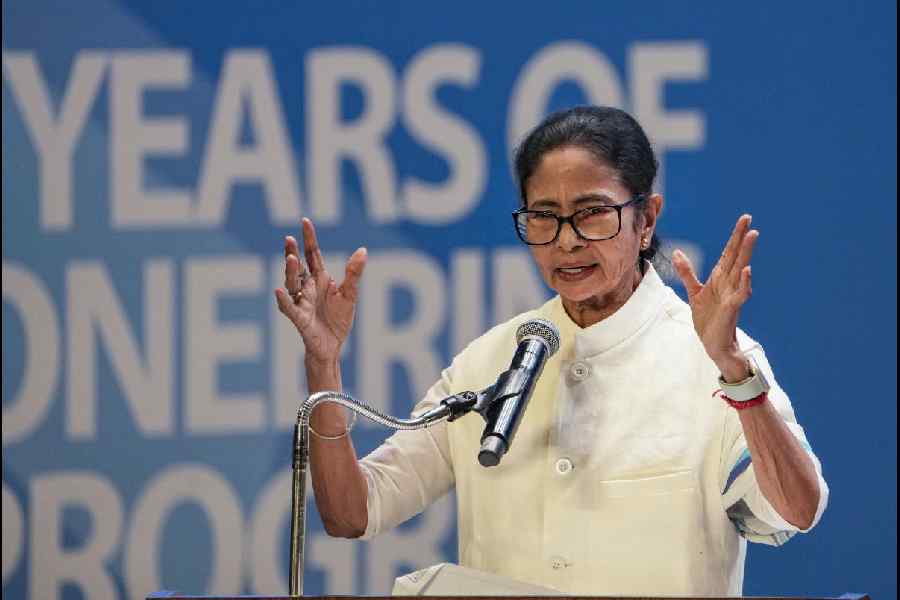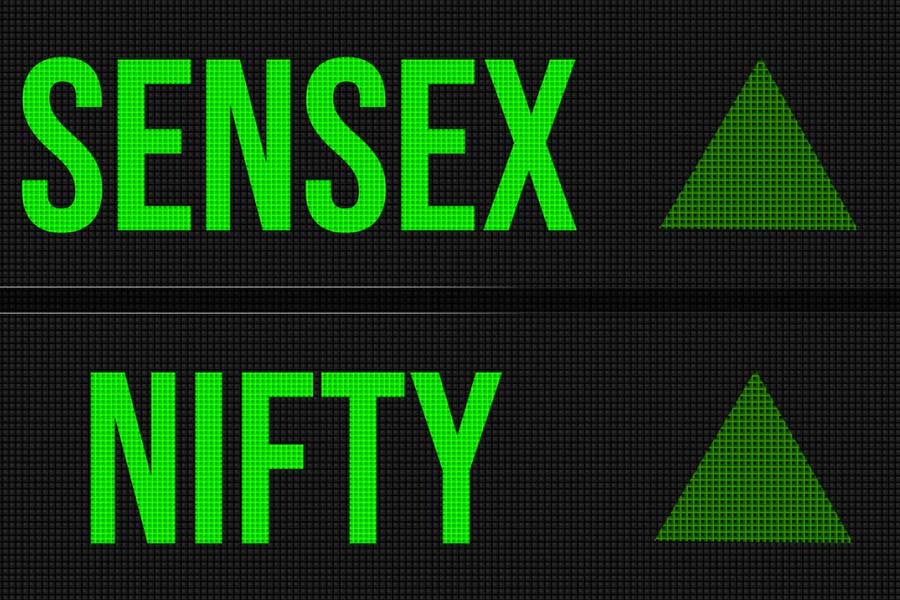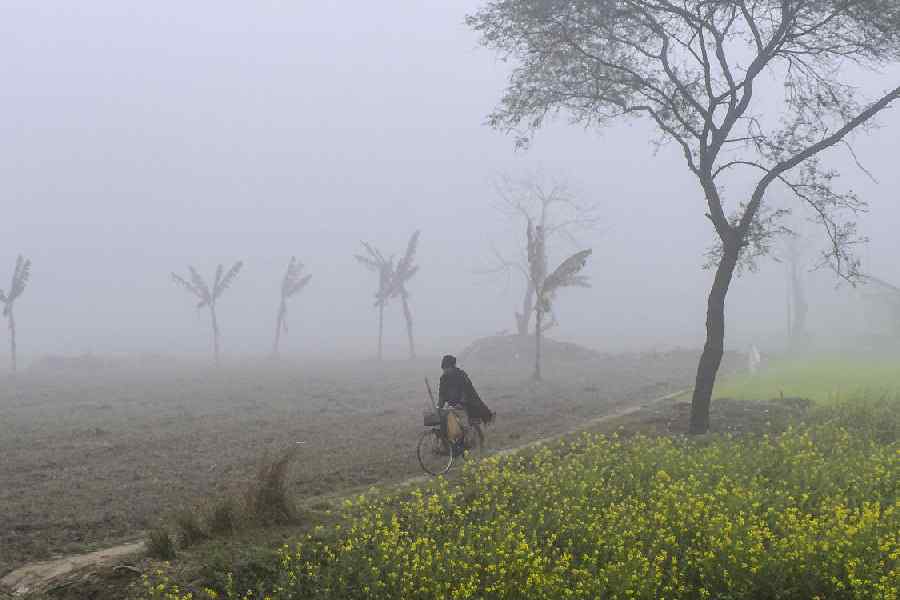WORK WOW

Who says you can’t do formals with sustainable fashion? Look how actress Anindita Bose slips into a Chanderi trench dress by Sneha Arora. “This is part of our spring-summer ’18 collection and is made of digitally-printed Chanderi with knife pleats and organza detailing. It’s an easy silhouette, perfect for the boardroom-to-dinner look,” said Sneha. Earrings and a cuff by A Bling Story accessorise the look.

Corporate wear gets a sustainable twist. Regular trousers are paired with a Dhruv Vaish handwoven cotton shirt with thick and thin stripes.
PUB CRAWL

A hand-embroidered cotton-muslin pencil skirt in bright yellow by Farheen Rahman and a sleeveless blue cotton top by organic, ethical brand Indricka have replaced the LBD. Earrings and a cuff by A Bling Story and embroidered belle flats by Rohan Arora complete the look. “The handloom skirt has a doodle-like embroidery and uses upcycled sequins,” says Farheen, a city-based designer who supports fair trade through her work.

Denims are paired with a Woody Allen hand-embroidered T-shirt from Brown Boy. Made of organic cotton and water-based ink, it spells casual cool. “Organic doesn’t mean boring. Sustainable apparel can be trendy, too, and we are here to make it happen,” said Prateek Kayan, who owns Brown Boy, a US Fair Trade-certified menswear brand.
BRUNCH-READY
It has taken a long time for people to actually understand sustainable fashion and it has often been viewed as the baggy, faded, hippie cousin of mainstream fashion. Brands have now started to make sustainable practice integral to their work. I am hoping for a world where everyone involved in making clothes gets a fair deal and they understand that it is also possible to design sustainably
— Anindita Bose, actress

A flowy ikat maxi by Karghaai with cool leather straps made of upcycled materials, and accessorised with teal feather earrings from A Bling Story — a look that’s sure to turn heads at a ladies’ brunch.

This brunch look is off the beaten track. Moizz Hanif, a model, dresses up in a hand-embroidered, asymmetrical draped kurta by Roshe, teamed with denims, and footwear by Rohan arora.
DAY ABOUT TOWN

There’s nothing more comfy than a linen shirt and trousers when it comes to summer daywear. The longline shirt in a pale yellow and navy loose pants — both by Khanijo — are easy and breezy.

For a relaxed day out, this chic shirt-dress accessorised with a coral cloth necklace — both from sustainable brand Deshaj — is totally on point. A pair of brogues from Toile balances the look. “The handloom cotton shirt-dress was made with vegetable dye by the craftsmen at our design centre in Santiniketan. We believe in zero-waste, which is why the necklace is made of surplus fabric,” said Sonali Chakraborty of Deshaj.
COCKTAIL DO

Organic fashion doesn’t necessarily have to be about khadi and linen. Designer Rimi Nayak shows how to be environment-friendly while going glam, with this one-shoulder pure crepe draped dress with handmade bird-detailing. Jewellery by A Bling Story and footwear by Rohan Arora jazz up the evening look. For him, a white cotton-linen shirt jacket by Dhruv Vaish lends a touch of classiness.

While sourcing clothes for this t2 shoot, I found so many designers I didn’t know about and I think their ensembles are fantastic. The misconceptions about sustainable fashion are many but very trendy designs and silhouettes are now being made, and Calcutta has started to appreciate it — Neha Gandhi, stylist
A swot analysis of sustainable fashion by its champions

Gaurav Khanijo, Delhi
There’s rhetoric about sustainable fashion at the moment but there’s still a long way to go simply because there’s too much misinformation surrounding it. First, the emphasis needs to be on sustaining a process that does not pollute the environment and sustains our weavers, and then comes the use of the right fabric. Getting this knowledge across to our consumers has been a struggle.
Strength: The fact that cotton, handlooms and weavers abound in India.
Weakness: Due to all the misinformation, sustainable fashion designers and practitioners are always having to prove and justify themselves.
Opportunity: The present-day focus on sustainable fashion could be used to our advantage with the help of right platforms.
Threat: The appetite for fast fashion and lack of awareness among customers.

Sneha Arora, Calcutta
I think the biggest misconception is that sustainable fashion is only about using khadi and handwoven fabrics. It has to be about the entire production process that has to be sustainable and we should look towards helping our weavers and craftsmen to sustain themselves as well.
Strength: The fact that sustainable fashion garments have longevity and that they do not impact the environment.
Weakness: People misunderstanding the concept of sustainable fashion.
Opportunity: Using modern technology to our advantage to reduce both costs and wastes.
Threat: Fast fashion and the consumer’s need to buy new clothes every season.

Dhruv Vaish, Delhi
I think sustainable fashion is a win-win for our industry. It is good for the environment and supports our weavers. The renewed focus on handlooms has revved up designers to improve their products as well.
Strength: Sustainable fabric has a unique look.
Weakness: It is tough keeping a check on the quality as steady and fast supply is still difficult. Also, the costs involved are high.
Opportunity: There is huge scope for making customers more aware as only a small chunk of people know about it and wear sustainable fashion now.
Threat: Fast fashion, as it’s difficult to increase the volume of production for sustainable fashion while keeping the prices low.

Rimi Nayak, Calcutta
Sustainable fashion is a philosophy which goes beyond the mere notion of using handloom fabrics. To me, it is more about creating a system which can be supported indefinitely in terms of human impact on the environment and social responsibility. I try to achieve a zero-waste production process so that carbon footprint can be reduced. Most of our dresses are in drapes, so the patterns are made in a way to minimise waste. We also try to recycle waste fabrics by turning them into accessories.
Strength: There’s a lot of buzz about sustainable fashion at the moment and a lot of willingness to take it forward.
Weakness: There isn’t enough credible and correct knowledge about it yet.
Opportunity: There’s a lot of scope to focus on the complete production process in order to minimise waste.
Threat: Many people are gullible enough to be deceived by fabrics and processes with the tag of ‘organic’ or ‘sustainable’ as these are not yet transparent enough for people to verify.
Text: Anannya Sarkar
Pictures: Pabitra Das
Location: Calcutta Bungalow, 5 Radha Kanta Jew Street
Models: Anindita Bose and Moizz Hanif
Styling: Neha Gandhi; stores: Kalon (for Dhruv Vaish & Khanijo) and Toile (for Karghaai, Farheen Rahman & Indricka)
Make-up: Sourab Mitra; hair: Swarup Das










